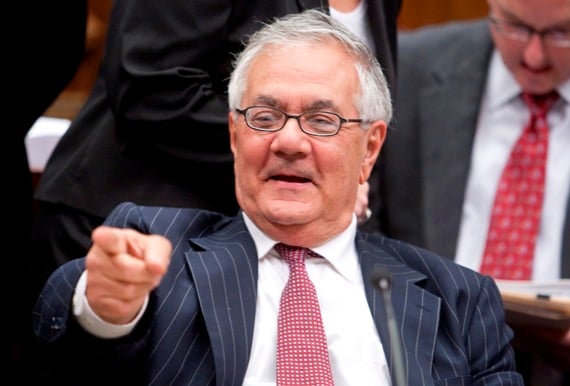U.S. Representative Barney Frank urged members of the congressional committee charged with reducing the U.S. budget deficit to impose a risk-based fee on large banks with over $50 billion in assets and hedge funds with over $10 billion.
U.S. Representative Barney Frank urged members of the congressional committee charged with reducing the U.S. budget deficit to impose a fee on large banks like Goldman Sachs Group Inc. and JPMorgan Chase & Co.
Frank, a Massachusetts Democrat and top member of his party on the House Financial Services committee, proposed a “risk-based fee” for all financial companies with more than $50 billion in assets and hedge funds with more than $10 billion in assets. Frank's proposal came in an Oct. 12 letter to Senator Patty Murray, a Washington Democrat, and Representative Jeb Hensarling, a Texas Republican, who serve as co-chairmen of the Joint Select Committee on Deficit Reduction.
“Revenues must be a part of any Joint Select Committee proposal, otherwise crucial programs within the jurisdiction of the Financial Services Committee and across the government will be at risk of devastating cuts,” Frank wrote.
The senior Democrats on at least 15 House committees submitted recommendations to the so-called supercommittee, which faces a Nov. 23 deadline to propose a plan to reduce the U.S. deficit by $1.5 trillion. If the panel deadlocks or Congress doesn't approve its recommendations by Dec. 23, across-the-board spending cuts of $1.2 trillion are set to take effect in the fiscal year beginning Oct. 1, 2012.
Frank proposed a similar fee during negotiations over the Dodd-Frank Act last year; it wasn't included in the final version of the bill passed by Congress.
Frank's letter included nine recommendations to the committee. Eight of the recommendations would raise revenue, including legalizing Internet gambling and increasing the guarantee fees charged by mortgage firms Fannie Mae and Freddie Mac by 10 basis points.
The letter's lone spending reduction proposal would require Treasury Department officials to fly commercial on business trips. Treasury Secretary Timothy F. Geithner, following in the footsteps of his predecessor Henry M. Paulson Jr., uses military air transportation “even when flying to safe locations,” Frank said.
--Bloomberg News--







